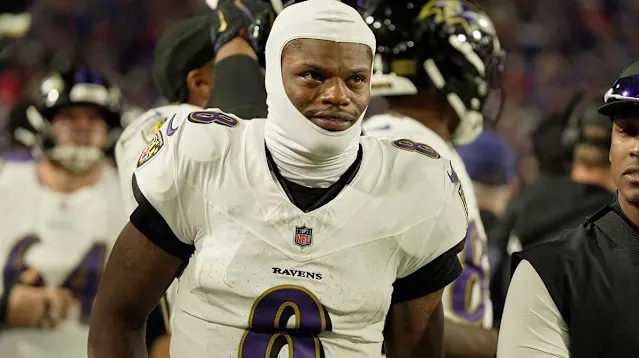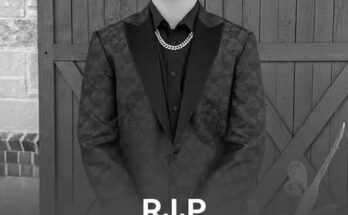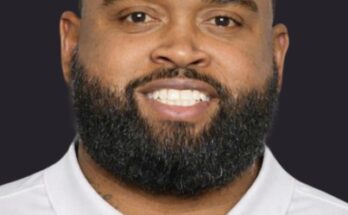Lamar Jackson had watched the game slip through the Ravens’ fingers with the haunting familiarity of missed opportunity, yet nothing pierced him in that moment quite like Derrick Henry’s miscue. With time slipping away and the Ravens clinging to a tenuous 40–32 lead, Henry—who’d been a force all night—fumbled the ball away. That singular act sparked the Bills’ improbable rally and crystallized Jackson’s own reckoning with what can go wrong when one moment flips a game upside-down. In the hush of the locker room that followed, Jackson zeroed in on Henry, eyes searching—not with anger but with a rare, shared understanding.
He said: “Let that go, man. He’s already did enough for us. Things happen. Unfortunately, it just happened at the wrong time. I’m not going to knock him for that. Shoot, I fumbled in the playoffs. It is what it is.” The words were quiet but heavy; more than a pat on the back, they conveyed both absolution and connection. (SB Nation)
Think through all the weight behind that exchange. It wasn’t a reporter’s question, not delivered under spotlight’s glare. It was the hush after the storm, inside a space that only a few could access. Jackson had watched Henry bulldoze defenses all evening, notching two touchdowns and rumbling his way to nearly three hundred total yards. He wasn’t going to let a single play—an untimely, yet unintentionally brutal turnover—define that performance, or the season’s early promise. The message was simple: you gave everything. Don’t let one moment undo much more that you’ve built.
Jackson’s own body of work provided the backdrop. He’d been here before, a similar narrative from his playoff exit playing like a broken record. He’d fumbled at bad times, too—even when the stakes were higher than any regular-season tilt. That aspect of “I’ve been there” soothed the sting of blame, shifting judgment into something gentler. “I fumbled in the playoffs,” he admitted—his way of acknowledging imperfection, of creating a sort of emotional parity, a recognition that this kind of thing happens, even to the best.
It was the embodiment of leadership, real leadership—not the bark of orders, not the self-congratulatory statements or highlight reel speeches. This was something quiet and raw. He didn’t try to minimize Henry’s feelings, he didn’t deflect. He offered a mirror: look, you’ve carried us. You’ve been King Henry. You’ve made defenders look foolish. That’s the truth. Let that be who you are—not this one moment, happening in the worst possible place at the worst possible time.
Stealth and honesty—it’s how Jackson often leads now. He’s one of the league’s elite athletes, with MVPs and All-Pro honors perched on his résumé, yet he’s growing more vocal, more willing to talk to teammates individually, to offer support. Earlier that summer in training camp, Henry relayed Jackson’s consistent call to, “put the work in right now… do what we need to do each and every day to get where we want to go.” It’s this kind of constant, unflashy messaging that cements trust, that creates buy-in when playoff pressure comes knocking. (Baltimore Beatdown, SI)
That message after the fumble, however, was different. It wasn’t a pep talk. It wasn’t a public rally cry. It was the acknowledgment of pain, of falling short, of the soul-crushing realization that one mistake might’ve cost 60 minutes of grind. But even there, he wanted to lift Henry up. “He’s already did enough”—Jackson said—not just about that game, but about Henry’s entire contribution. That one phrase said more than a glowing season recap ever could.
And here’s the complexity: sports fans love easy scapegoats. When things go wrong, fingers get pointed. “He blew it.” “Look at what he did.” But here was Jackson, looking deep into the core of a veteran running back, clearly rattled, clearly down, and he stopped that narrative before it could take shape. He gave permission for the team, for the locker room, for the narrative at large, to reframe how to view Detroit Aces. He affirmed that he believed in Henry—not just as a playmaker, but as a person, as a teammate, as someone no single moment can define.
That’s leadership. That’s being a quarterback. That’s being human.
In the aftermath of that night, the media dissected the fumble, the missed two-point conversion, the defensive breakdowns, the play calling. But inside the Ravens’ locker room, something subtler happened: they didn’t treat Henry like the bad guy. There was no lambasting. There was real forgiveness.
“I told [Henry], ‘Let that go, man,’” Jackson had said, and you can almost hear the pause after “man”—like a breath, a moment of collective exhale. And then: “He’s already did enough for us. Things happen.” Those words, placed with intention, helped draw the line between what had happened and what mattered going forward. “I’m not going to knock him for that.” The simplest path during loss is to sully someone’s legacy. The harder path is to protect something bigger—belief, trust, cohesion.
He added, with quiet acceptance, “Shoot, I fumbled in the playoffs. It is what it is.” Those words—it is what it is—echo the ethos Jackson often carries. Wide smiles and scramble magic notwithstanding, he knows the game doesn’t always deliver perfect endings. He’s had the heartbreak. He’s had the scrutiny. And here, he extended a hand to Henry, pulling him out of isolation and reminding him: we’re in this together.
That sentence—“Shoot, I fumbled in the playoffs”—carries multitudes. It’s confession. It’s solidarity. It’s humility. It’s leader markers: I’ve failed, I understand, let’s move on. It’s an anchor for the next day, the next drive, the next game, the next chance. It’s grit, but sealed with empathy.
We know what happened after—they’ll play again, the film gets studied, the season moves on. But that moment, that exchange—they built something. Not a soundbite that’ll live in highlight reels, but a quiet moment of mutual respect. A signal that Jackson believes in Henry not for the nights when everything clicks, but especially when it unravels. Because that’s when leaders matter most.
And in that place, honest and unguarded, he leaned into friendship, into trust. “Let that go,” he said. And for a moment, the weight lifted.



